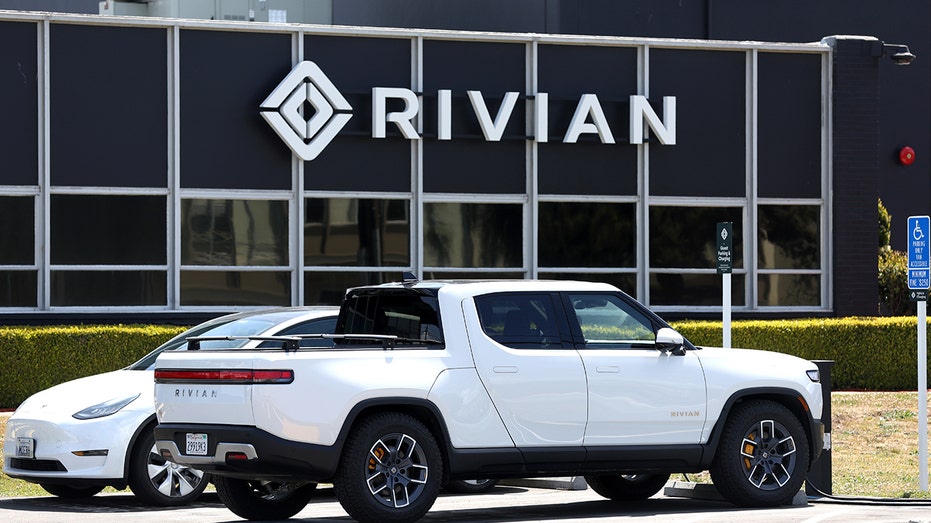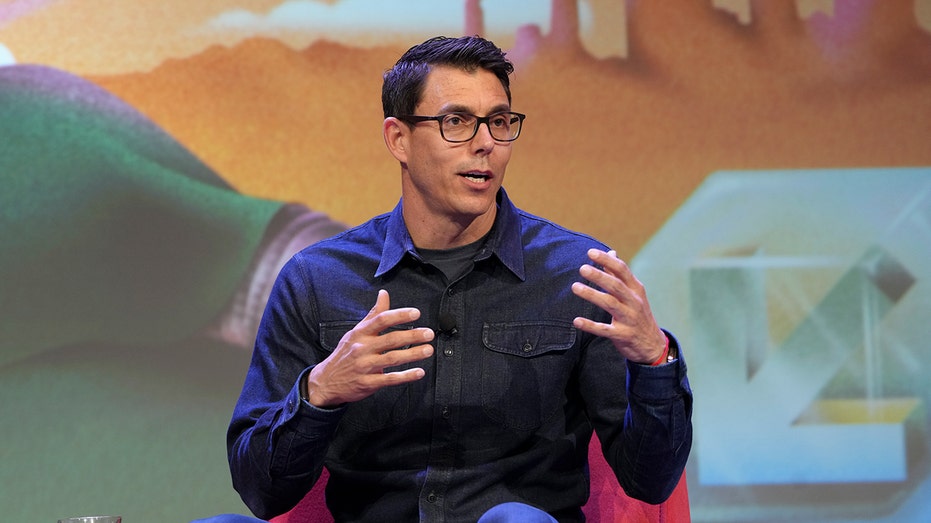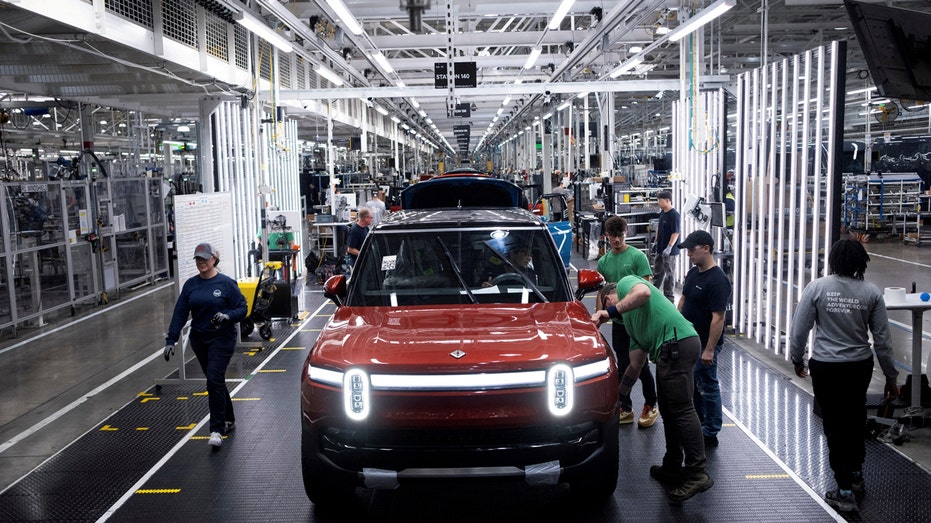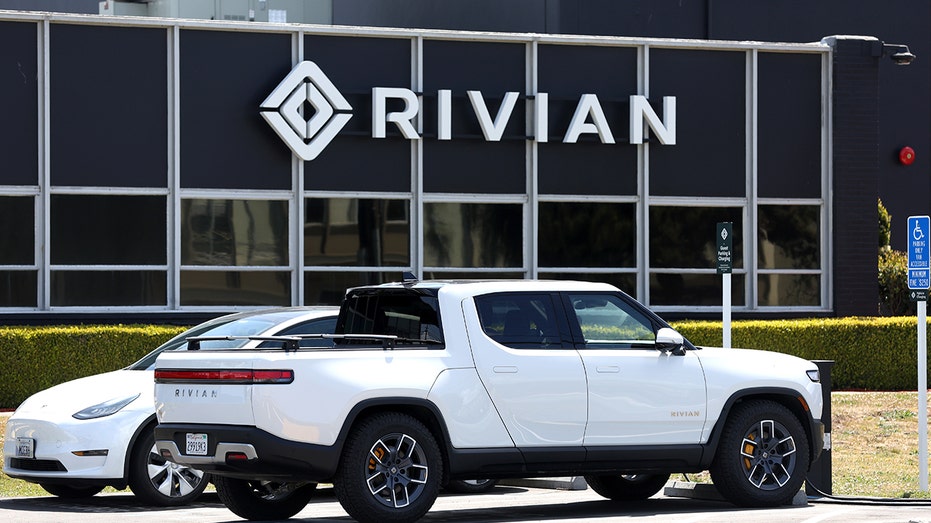Rivian founder and CEO RJ Scaringe discusses the impact of import tariffs on ‘The Claman Countdown.’
Rivian founder and CEO RJ Scaringe on Tuesday discussed the Trump administration’s tariffs and how the electric vehicle (EV) maker is navigating them during an appearance on “The Claman Countdown.”
Scaringe told host Liz Claman that consumers have a “lot of questions” about “what’s going to happen” with the pricing and availability of vehicles in the U.S. amid President Donald Trump’s tariffs and that Rivian is “trying to navigate that as thoughtfully as we can.”
The president announced 25% tariffs on imported passenger vehicles, light trucks and certain key auto parts late last month. They are among many levies on imports Trump has unveiled since returning to office, including those on steel and aluminum, as well as reciprocal tariffs.
SEE IT:RIVIAN UNVEILS REDESIGNED ALL-ELECTRIC SUV AND PICKUP

Electric-vehicle startup Rivian Automotive Inc. is suing a key supplier of seats, warning that a pricing dispute could impact production of an electric van ordered by Amazon.com Inc. (Justin Sullivan/Getty Images / Getty Images)
Scaringe said that Rivian’s EVs, including the second-generation R1S that he appeared beside during “The Claman Countdown,” are manufactured at its facility in Normal, Illinois.
“We’ve been very focused on building out our supply chain, of course, our production footprint here in the U.S. and, of course, all the technology is developed here as well,” he told Claman.
Asked about where Rivian’s steel and aluminum comes from, Scaringe said it was “a mix.”
“One of the things with automotive is the supply chain is so complex, where we have hundreds of suppliers providing parts from, say, a headlight or a tow hook or tires or the structure under the skin here that are coming from not only a set of suppliers that supply to us, but those suppliers have suppliers, and then in turn, those suppliers have suppliers, so there’s tier two, tier three,” he explained. “So in our case, it is a mix. Given the new environment from a tariff point of view, we’re working really hard to see what we can change, but they’re difficult to change.”
RIVIAN ANNOUNCES TWO NEW EV SUV LINES, INCLUDING ONE SURPRISE
He acknowledged that Rivian is not entirely escaping Trump’s tariffs but said the EV maker has a “very U.S.-centric supply chain.”

RJ Scaringe at Featured Session “The Moment We’re In: Transitioning How We Move, Think and Change The Planet” during SXSW Conference & Festivals at Hilton Austin Downtown on March 11, 2025 in Austin, Texas. (Amy E. Price/SXSW Conference & Festivals via Getty Images / Getty Images)
“We build the big pieces all here,” he told Claman, mentioning the motors and battery as examples. “We developed the software stack, the electronics, but there are a lot of components that come from a global supply chain.”
Scaringe said “there’s a tremendous amount of content that’s coming from suppliers that are both in the U.S. but also suppliers who are elsewhere” while looking inside the R1S with Claman.
CAR DEALERS MOVE TO COMBAT IMPACT OF TRUMP AUTO TARIFFS WITH AI TOOLS
During the interview, she also noted that Rivian is expanding its plant in Illinois and asked Scaringe whether he had been in touch with the White House, which has been pushing to boost manufacturing in the U.S. with tariffs and other measures.
“When we think about the tariffs, of course the 25% auto tariff hits everybody,” he said. “We do rely on a supply chain that across its tiers has a number of components that come from other countries and then, importantly, the trade restrictions and what we’re seeing in terms of rare earth metals out of China, that’s a real challenge for electric vehicles.”
China recently imposed restrictions on the exportation of certain rare earth metals and magnets from its country.

Workers assemble second-generation R1 vehicles at electric auto maker Rivian’s manufacturing facility in Normal, Illinois, on June 21, 2024. (Reuters/Joel Angel Juarez/File Photo / Reuters)
CLICK HERE TO GET FOX BUSINESS ON THE GO
“Essentially every electric car on the road today is using what’s called a permanent magnet motor,” Scaringe explained, noting such magnets “generally use some type of rare earth metal.”
He said the rare-earth metals can be found in many places globally but “in terms of the processing of the materials, that happens almost exclusively in China.”
Scaringe also talked about the EV industry and what is needed to increase its share of the U.S. vehicle market. EVs made up 8.1% of vehicle sales in the U.S. in 2024, according to Cox Automotive.
“I think a huge part of this is giving customers choice,” he said. “If you’re looking at buying an electric vehicle for under $50,000 today, there’s really very, very few highly compelling choices. And for that reason, you’ve seen Tesla with very significant market share for a long time now, over 50% of the market share, and that’s actually a reflection of limited grade choices. And so what we need to see to go from 8% to 15 to 20 to eventually 100% of vehicle sales being electric, a lot of choice.”
| Ticker | Security | Last | Change | Change % |
|---|---|---|---|---|
| RIVN | RIVIAN AUTOMOTIVE INC. | 11.91 | -0.12 | -1.00% |
He said there needs to be “different form factors, different features, different brands and styling and aesthetic treatments to what a car looks like” among EVs.
Rivian currently makes the R1S SUV, R1T pickup truck and commercial electric vans. It also has the R2 and R3 in the pipeline.

